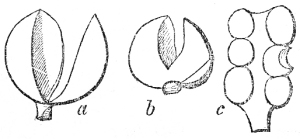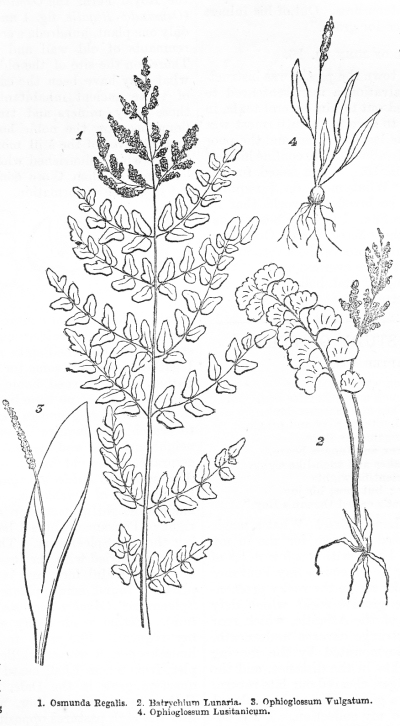|
Chapter
VII.
"Auld Botany Ben was wont to jog
Thro' rotten slough and quagmire bog,
O'er brimful dykes and marshes dank,
Where Jack o' Lanterns play and prank,
To seek a cryptogameous store
Of moss and carex and fungus hoare,
Of ferns and brakes and such-like sights
As tempt out scientific wights
On winter's day; but most his joy
Was finding what's called Osman's Roy."
The district of the Land's End! What a magic charm
these words used to have for me in my childhood ! And now I was within a
few miles of this wondrous locality! Of course my Penzance friends
failed not to take me to the rocky promontory. I gazed on the granite
rocks which defy the fury of the waves of the Atlantic, which roar
terribly. I saw the strange caverns underneath, and the noble mass
surmounted by the moving rock. The Lizard lights in the distance, and
the glow-worms in the hedges, cheered our late return. Of pleasure I had
had a goodly share; but, alas, I had brought no fern to my collection. I
was advised to search Marazion Marsh: ''That is an excellent field for
wild-flowers," said my friends, "and probably for ferns also." So an
early day was appointed, and we traversed the sands, crossed the
railroad, entered a broad highway which was raised above the surrounding
land, and, passing over a bridge built across a slow stream or standing
water, we turned quickly to the left, and began to examine a large tract
of waste land. Of this some was bog, some sandy ground, and some quite
under water. That season had been a late one, and the delicate pink
bells of the bog Anagallis still quivered in the breeze, while a
few spikes of the musk Bartsia yet remained. But what was that
stately plant growing under the shade of the brushwood at some distance
from us, with its somewhat glaucous foliage and tall compound spire of
seed? In my eagerness I forgot the swampy nature of the ground, and
springing forward found myself standing by the plant in question
ankle-deep in water. But I heeded not any such trifling personal
inconvenience, for I had found the object of my ambition, the Royal
Fern, the Osmunda or Osmund's Roy! (Osmunda Regalis, fig.
1 and a. And
it was not only one plant, hundreds were growing
there, under remnants of old wall and scraps of old hedge. There, on the
site of the old Jewish town, behind what may have been the carefully
planted fences of those ancient inhabitants of the Mara Zion, those
early miners and traders in Cornish tin, flourishes now the noble head
of the English representatives of the still more ancient family, the
family which flourished when rocks only a degree less ancient than those
containing the ore, were yet in course of formation.

The Fronds grew to a noble height, the fruitful ones
more erect than those unburdened with spikes. The fruit was contained in
round cases, like grains, growing in profuse abundance upon the many
stalks of the branched spike at the top of the frond. I gathered
several, some for myself, and some for Esther, and returned home proud
of my new acquisition. I lost no time in writing of my success to my
dear young cousin, and I begged her both to search and inquire
unremittingly in her own neighbourhood, and ascertain the truth of the
assurance of an old herbalist there, that both the Moonwort and
Adder's-tongue were to be found in the pastures of Swaledale. In
the meanwhile we made a delightful excursion along the cliffs to the
right of Penzance, where I had the delight of finding the Sea
Spleenwort. The roof of a cave was fairly tapestried with the broad and
verdant fronds of this beautiful fern, and in one or two sheltered
places I found small plants of the lance-shaped Spleenwort (Aspkenium
marinum and lanceola-tum). Esther made every effort to comply
with my request. She went to the clergyman's old housekeeper, a woman
skilled in herbs and simples, from whom I had heard that the two ferns
in question grew in the Dale. Betty begged Miss Esther to accompany her,
and leading the way into the high pastures opposite her father's house,
she showed her the Adder's-tongue in abundance, telling her that she
gathered a great deal every year to make into ointment for bruises and
swelling. "Don't take none o' them pieces, Miss Esther, to send to your
friend," she said, "for it dies down at this time o' year, and them
pieces is withered. I have some nice bits at home that I have kept for
bookmarkers, and I will give you one o' them." In an adjoining field she
pointed out the Moonwort growing amongst the low herbage, and so
assimilating with it, that an unin-structed observer would only have
supposed it a plant in seed. Betty said that this also made a good
ointment, and that superstitious folks thought that it would open looks
and bring the shoes off horses, but for her part she believed no such
witchery. Esther procured and sent me good specimens of this. Here I was
indeed fortunate. The Moonwort with its double row of crescent leaflets
and branched spike of grain-like seed-vessels lay in my hand, a near
though very humble relative of the noble Royal-fern (Batrychi-um
Lunaria, fig. 2 and b). The Adder's-tongue seemed at first sight
like a miniature of the Field - Arum, the tongue of seeds rising
from the broad undivided frond as from a sheath. The seeds are arranged
in a double row along the simple spike (Ophio-glossum Vulgatum,
fig. 3 and c.) Before concluding my series of visits I was fortunate
enough to receive the gift of a specimen of the pretty little Jersey
Adder's-tongue (O. Lusitani-cum, fig. 4). It differs from our own
Adder's-tongue in being smaller, in having narrower leaves, and there
being two or more leaves to each plant.
No pen can describe the keen pleasure with which I
regarded my collection of ferns. There lay the four Polypodys with their
round uncovered masses of seed-cases, the Scaly Spleenwort with its
scale spread back and cover rent or absent, and the Jersey fern with its
uncovered seed-masses, forming together the coverless order or
Polypodiaceae.
Next were placed the Woodsia with its round
fringed cover; the prickly four-ferns with their round covers fastened
in the centre; the six-shield

ferns with their kidney-shaped covers fastened in the
cut side; the three-bladder ferns with their thin bag-like cover; the
nine-Spleenworts, with their line-like masses and covering opening
towards the middle vein; the Lady fern with its roundish covering
attached by the side; the Hart's-tongue with its long seed masses and
membranaceous covers; the Brake with its seeds on the margin in a line;
the Parsley-fern with its circular masses on the margin; the Hard-fern
with its seed in two covered lines, and the Maiden-hair with its
crescent or roundish masses and thin covering;—all these forming the
covered order or Aspidiaceae.
The small order of the urn-bearing ferns or Hymenophyllaceae
were next, containing only the two Filmy ferns, and the
Bristle-fern. The Royal-fern stood next with an order to itself, the
fruit being naked. We termed this the Spike order or Os-mundacece.
Finally came the Moonwort and Adder's - tongue, also spiked, and
only differing from the Os-mundaceae in the seed case. These represented
the Ophioglos-sacece.
Such was my success. Did I owe it to myself? To my
own application and persevering search? These were themselves the gift
of God, elements bestowedup-on me with which to overcome difficulty. But
these were not my chief aids. Jacob said, in that melancholy scene when
he won his father's blessing by deceit, "I found the venison, because
the Lord thy God brought it to me." And thus when we take up the
study of any part of the works or dealings of God, and seek therein the
teaching of Him who "giveth to all men liberally and upbraideth not,"He
makes the complicated seem simple, the confused clear; He quickens the
vision, both intellectual and physical; He directs the way of our steps
and the tenor of our thoughts, and the samples of His marvellous
creation come into our hands, because the Lord our God beings them to
us.
|

